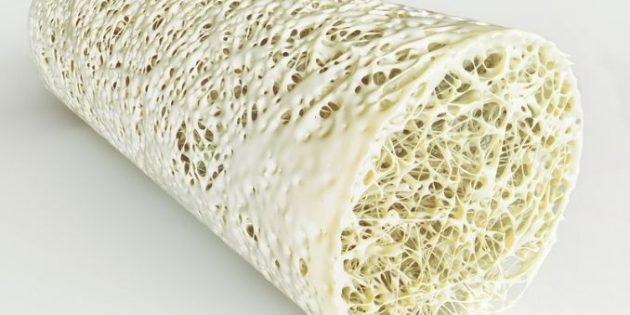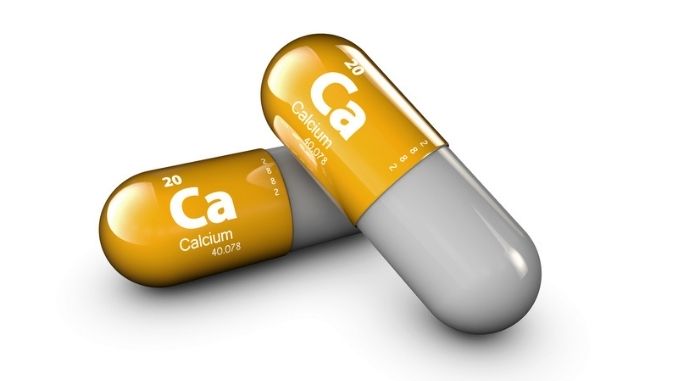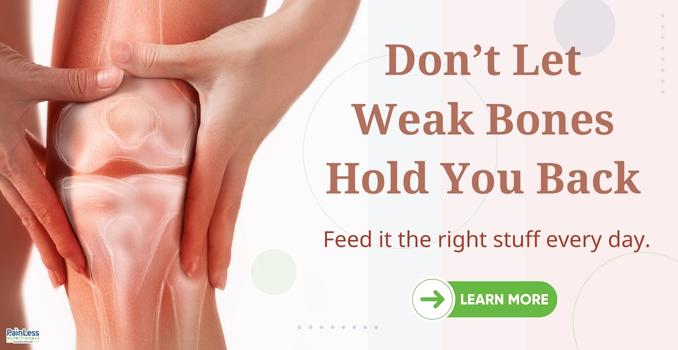If you have osteoporosis, there are prescription medications that can assist in building stronger bones. However, your body also needs vitamins and minerals that help your body better absorb the nutrients required to build strong bones. If you consume a well-balanced, healthy diet, you may be getting all of the nutrients you need. This means plenty of lean proteins, whole grains, fruits, and vegetables. Suppose you have diet restrictions (such as being vegan or lactose intolerant) or experience appetite loss, digestive disorders, or other factors that affect your nutrient intake. In that case, a bone health supplement may be necessary to meet your nutritional needs. In the case of osteoporosis, your body either lacks several vital nutrients or cannot use these nutrients properly. It may be in your best interest to use a supplement.
Osteoporosis is a porous bone disease. It is a condition where your bones become brittle, thin, and weak due to loss of bone mass. Your bones lose their density and become much more susceptible to breaks and fractures. If broken bones occur, this causes pain and disability and will significantly impact your everyday life. Osteoporosis is extremely common, with one in three women and one in five men over 50 years old experiencing a broken bone due to osteoporosis. Thankfully, there are various practices that you can engage in at any stage in your life to promote healthy bones. The earlier you start enacting healthy bone behaviors, the better, but it’s never too late to improve your bone health. Early prevention is essential for women who experience rapid bone loss after menopause when the protective effect of estrogen is lost.
Habits Can Contribute to Better Bone Health
As an adult, you can take various steps to protect your bones and avoid bone loss. Improving your diet, exercising, and quitting unhealthy habits can contribute to better bone health. A healthy diet includes adequate amounts of nutrients like calcium and protein. Get enough sun exposure (but not too much), take vitamin D supplements, or increase your vitamin D intake through oily fish, eggs, mushrooms, and fortified foods or juices.
Do your best to maintain healthy body weight, as being underweight can damage your bone health, and being overweight adds additional stress to your bones. Being active is essential for bone health, specifically weight-bearing exercises such as walking, running, and strength workouts. Your bones are stimulated to grow only when they experience stress so regular weight-bearing activities will keep the turnover of your bones high. If you smoke, try to quit and avoid heavy drinking. In addition to these practices, you can also promote bone health with supplements.
 Nutrients to Look for in a Bone Health Supplement
Nutrients to Look for in a Bone Health Supplement
The ingredient list should include the following nutrients when looking for a bone health supplement.
1. Calcium
Calcium is a crucial nutrient for bone health and is one of the essential supplements for osteoporosis. If you eat a balanced diet, you likely consume enough calcium. If not, a supplement can be helpful. Ensure that your supplement includes chelated calcium such as calcium citrate, calcium lactate, or calcium gluconate, as they are forms of calcium readily absorbed by the body. Chelated means there are compounds added to improve absorption. Keep in mind that your body has absorption limits and cannot drink more than 500 mg of calcium at once. Depending on the calcium content in your supplement, you may want to break up your intake over the day. Eating when you take your supplement can also increase absorption.
2. Vitamin D
Vitamin D aids in calcium absorption, so your body cannot utilize the calcium you consume without vitamin D. Unlike calcium, vitamin D is not naturally present in many foods. Some fortified foods have vitamin D added to help people meet their daily requirements. Sun exposure causes your body to produce vitamin D, but many people do not live in places with weather that permits adequate sun exposure. Vitamin D is easily supplemented and should be present in any quality bone health supplement.
3. Vitamin K
Vitamin K comes in many forms and plays many roles, one of which is helping calcium bind to your bones, building them up, and making them stronger. However, vitamin K can interfere with blood-thinning medications, and too little vitamin can be dangerous. Always talk to your doctor before increasing your vitamin K consumption.
Other Nutrients for Bone Health
Your bone health supplement should include calcium, vitamin D, and vitamin K. The following nutrients also play a role in bone health and may be appropriate for you.
4. Magnesium
Magnesium is a mineral naturally present in foods such as whole-grain bread, dark green vegetables, and nuts. It works with calcium to maintain your bone density. You probably do not get enough magnesium if your diet consists of many processed foods. If you take a multivitamin, it probably contains magnesium. The ideal balance in a supplement is two parts calcium to one part magnesium.
5. Boron
Boron is a trace element. This means that your body does not need much of it, but it is an essential nutrient that allows your body to use calcium. Boron also activates vitamins and minerals that play a role in bone formation. It is found in apples, grapes, nuts, peaches, and pears. Boron is not generally found in multivitamins, so ask your doctor if a boron supplement is right for you.
6. Silicon
Silicon is also a trace element essential for building healthy bones, tendons, and ligaments. Multivitamins do not usually contain silicon. Again, ask your doctor if you could benefit from a silicon supplement.
Bone health generally becomes a problem with age, but the earlier you and your loved ones practice bone-healthy behaviors, the longer you will have strong and healthy bones. Diet and exercise are essential for healthy bones, and supplementation can help ensure you meet the nutrient requirements for healthy bones. Ask your doctor if a bone health supplement is right for you.
Discover how to strengthen and protect your bones naturally. Click here for more information.

 Nutrients to Look for in a Bone Health Supplement
Nutrients to Look for in a Bone Health Supplement







